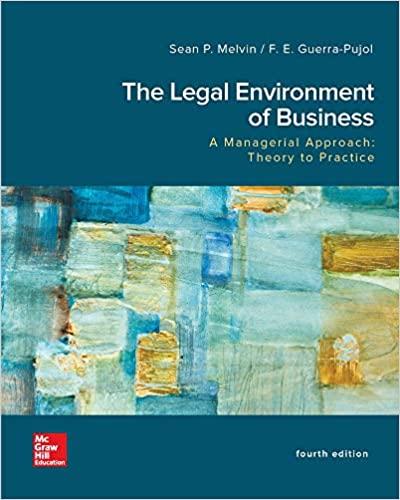An essential legal strategy in the world of business is legal risk management or prevention. In brief,
Question:
An essential legal strategy in the world of business is legal risk management or prevention. In brief, business firms work in tandem with their attorneys in order to anticipate legal problems before they occur and to take effective steps ahead of time to minimize such legal risks and potential civil liability exposure. This legal strategy identifies and minimizes future legal risks to the business.
A common method for minimizing legal risks in tort cases, for instance, is the use of disclaimers or “limitation of liability” clauses in business contracts. Although disclaimers are generally legally enforceable, courts may or may not enforce a particular disclaimer, depending on the facts of each case and the wording of the disclaimer. From a strategic perspective, however, disclaimers are designed to protect business firms from potential civil liability for negligence and other harms under tort law. Thus, a well-drafted disclaimer is a strategic or defensive measure, one that anticipates and attempts to reduce the risk of tort liability in certain situations. By way of example, consider the “terms and conditions” that computer users must agree to when installing a software update or when signing up for a free Internet service like Gmail or Facebook. Among the many provisions in the terms and conditions, there may be a disclaimer, and by clicking “I Agree” in the dialogue box, users are agreeing to the disclaimer as a matter of contract. To illustrate, let’s take a look at an actual disclaimer. Apple operates a cloud computing or data-storage service called iCloud. This service provides iCloud users the ability to save and store their personal data on remote servers, including such electronic data as photos, documents, and music files. After the iCloud accounts of many celebrities (e.g., Jennifer Lawrence, pictured) were hacked, Apple inserted (in ALL CAPS and underlined) the following disclaimer language in its iCloud Terms and Conditions: APPLE DOES NOT REPRESENT OR GUARANTEE THAT [iCLOUD] WILL BE FREE FROM LOSS, CORRUPTION, ATTACK, VIRUSES, INTERFERENCE, HACKING, OR OTHER SECURITY INTRUSION, AND APPLE DISCLAIMS ANY LIABILITY RELATING THERETO.[*]
CRITICAL THINKING QUESTIONS
1. Based on what you have studied in this chapter, was Apple negligent for not taking stronger measures to protect the iCloud accounts of its users from thirdparty hackers?
2. What legal or nonlegal strategies could iCloud users employ against Apple to defeat or circumvent Apple’s disclaimer?a
Step by Step Answer:

The Legal Environment Of Business A Managerial Approach Theory To Practice
ISBN: 9781260247800
4th Edition
Authors: Sean Melvin, Enrique Guerra-Pujol





